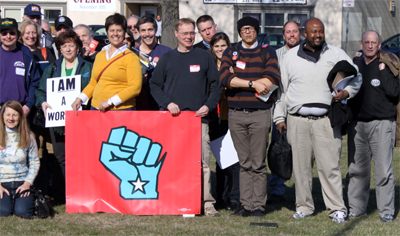Madison: When Looking for Leaders, Look Around

Madison troublemakers went to school April 1-2. They’ve had plenty of reasons to get together in recent months, but the school gave them a chance to make sense of it all—and start planning next steps. The Troublemakers School was promoted by the area central labor council, but the local organizing committee used the huge demonstrations at the Capitol to get the word out even more widely.
Participants discussed how to build member-to-member unions; contract campaigns; the history of labor, immigration, and race; knowing your rights; engaging the media; campus and community solidarity; economics 101; electoral strategy; organizing; and using art for mobilization. Public sector employee workshops were among the largest.
Eric Cobb, executive director of the Madison-area building trades council, shares his impressions.
Entering the upper hallway of the Labor Temple on Friday evening, one can tell there’s something different in the air. The once stale cinder-block walls of the Temple are now teeming with life, an energy not felt here in quite some time.
People are energized. The “Movement,” as some call it, has done something to them. It has empowered them. It has enthralled some, it has outraged others, but it has done something that no other event in the last 50 years has been able to do: bring everyone together, the Collective Everyone.
No matter your gender or race. No matter your labor or community affiliation. No matter at all.

SUPPORT LABOR NOTES
BECOME A MONTHLY DONOR
Give $10 a month or more and get our "Fight the Boss, Build the Union" T-shirt.
Now, 170 labor leaders and activists gather together at the Labor Temple for the same reason—a Troublemakers School. It couldn’t have arrived at a better time.
Interest, of course, was inspired by the tens of thousands of people from all walks of life covering the Capitol Square like a giant anthill. Tiny fists raised in the air in solidarity for their teachers and their parents. Elderly fists raised as high as they can reach, in solidarity for their caretakers and their children.
Everyone from the heart of the state to the inner cities stood in solidarity together. For the first time in our history the people found something we can all agree on: this attack on everyone’s civil liberties, rights, and pursuit of quality of life—is wrong. Everyone can see it because, as it was so aptly described in the final moments of the Troublemakers School—this is a naked attack.
What most attending the school sought was education and organizing tools. It was a unique opportunity to work with, speak to, engage, be inspired by, and increasingly push forward this movement with the most forward-thinking labor leaders and activists in our communities and around the country. An interactive exchange of thought-provoking ideas, a Troublemakers School is, most simply put, education as a way of empowering yourself, and empowerment as a way of education.
J. Eric Cobb is executive director of the Building Trades Council of South Central Wisconsin.





